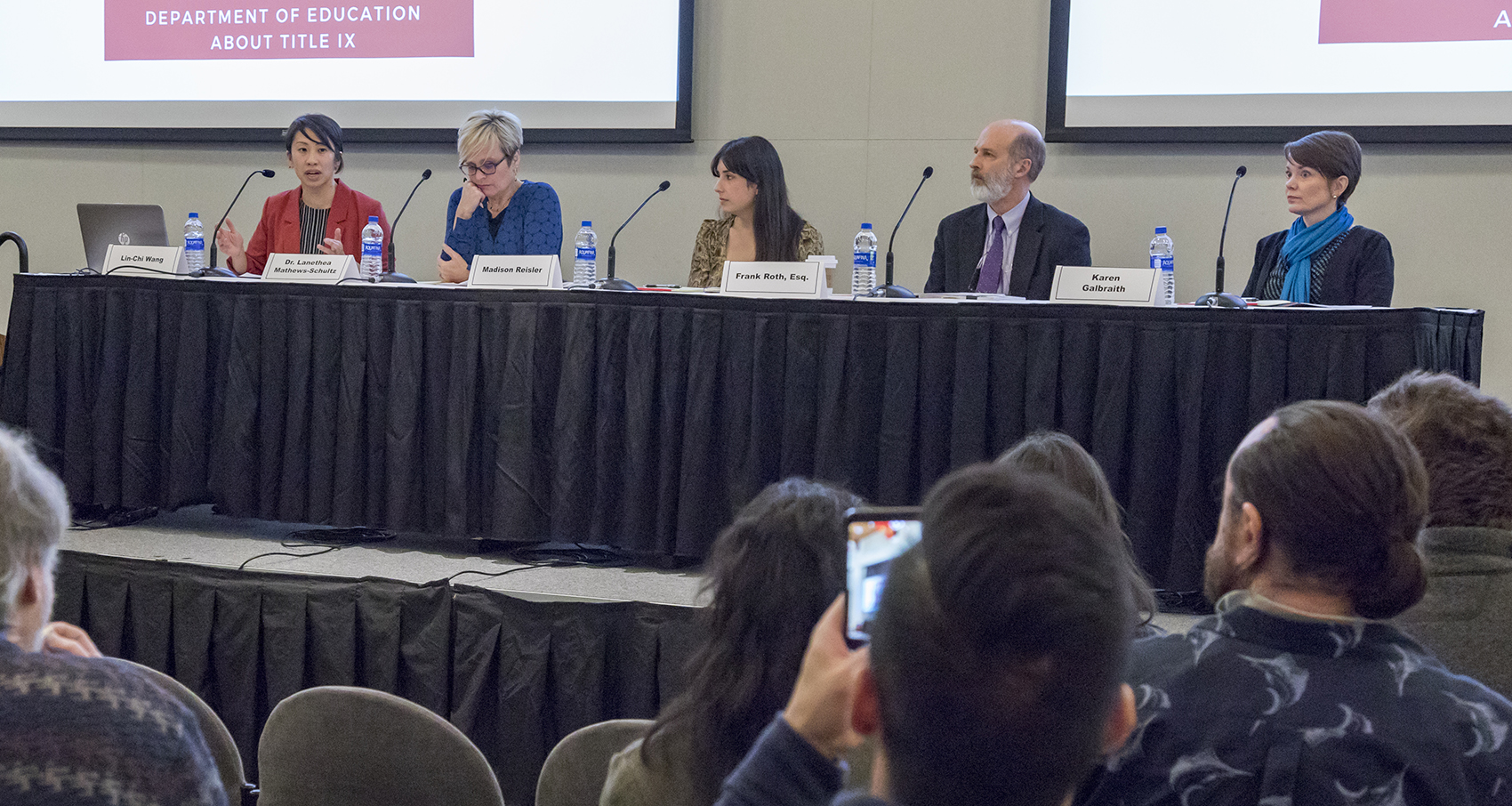Title IX Discussion Brings Together Expert Panel, Campus Community
The event preceded tomorrow's end of the public comment period on proposed changes.By: Meghan Kita Tuesday, January 29, 2019 10:39 AM
 An expert panel discusses proposed changes to Title IX.
An expert panel discusses proposed changes to Title IX.On Thursday evening in the Seegers Union Great Room, dozens of students, faculty members, staffers and members of the community gathered for “What’s Happening With Title IX?” The Office of Equity & Title IX and Voices of Strength, Muhlenberg’s peer education group for sexual assault awareness and gender violence, organized the event in response to proposed changes to the law. Title IX prohibits sex discrimination in educational institutions that receive federal funding, from elementary school through graduate school.
On the panel were Political Science Department Chair and Professor Lanethea Mathews-Schultz; psychology major, women’s & gender studies minor and Voices of Strength member Madison Reisler ’19; Frank Roth, Lehigh University’s general counsel; and Karen Galbraith ’95, the training projects coordinator at Pennsylvania Coalition Against Rape. Associate Dean of Students & Director of Equity and Title IX Lin-Chi Wang moderated the discussion.
The panel began by reviewing the history of Title IX, which became law in 1972 and, as Galbraith and Roth noted, was originally often associated with cases of gender equity in athletics. More recently, it’s been associated with cases of sexual harassment and assault. The current Department of Education is seeking to change Title IX in a way it hasn’t been altered since 1975: through changes to regulations that require notice and a public comment period. Under previous administrations, “guidance documents” shaped how the law was interpreted and applied, but those guidelines changed from one president to the next. The proposed changes, if enacted, would be more permanent.
A summary of the proposed changes can be found here. Mathews-Schultz noted that critics of the Obama administration’s guidance felt that it favored the rights of the complainant over the rights of the accused, which could, in itself, be seen as a form of sex discrimination. The proposed changes would create what Galbraith called a “very narrow definition of sexual harassment” and require institutions to be found “deliberately indifferent” to sexual harassment complaints in order to be sanctioned for violating Title IX.
And, in what Wang referred to as the “most controversial proposed addition,” institutions of higher education would be forced to provide live hearings, cross-examination by advisors and other courtroom-like proceedings in cases of alleged harassment.
“To me, this is an overt adoption of the judicial, adversarial model,” Roth said. Colleges and universities would need more resources in order to follow this standard, he added, which could result in costs that could get passed on to students. Regarding cross-examination, he said, “There are other ways to get at the truth. Cross-examination is a combative, adversarial model.”
“Being cross-examined is hugely revictimizing and traumatic,” Galbraith added, and if the proposed judicial model were adopted, the power imbalances already present in a sexual harassment or assault proceeding would be exacerbated by which student (the accused, or the complainant) could afford to hire a better attorney, or could afford to hire an attorney at all.
“This issue is one that the College is passionate about talking about,” said Vice President of Student Affairs Allison Gulati at the end of the discussion. “We want people to engage their voices in this. I’m glad to see so many people here looking critically at this issue.”
“The main feedback I received from the panel discussion was that it was beneficial to hear of and discuss the impact of Title IX and potential impact of major and important changes being made to Title IX regulations from multiple perspectives and disciplines,” Wang said later. “During the event, we looked at some of the actual language of what the proposed changes are, which was eye-opening and thought-provoking for the attendees. I encourage anyone who is interested in issues of gender inequity, sexual violence, and sex discrimination to seek education and information on the proposed Title IX regulatory changes and submit a comment online.” The deadline to comment is January 30, 2019, at 11:59 p.m. Eastern time.
When the proposed changes were first announced, the campus community received an email that read, in part, "While this rulemaking process is underway and thereafter, the College will remain steadfast in ensuring that sexual misconduct has no place at Muhlenberg. We continue to develop and use the most innovative and effective initiatives to educate our community. We will also maintain our efforts to ensure that members of our community feel confident in reporting incidents and will continue to handle complaints in a manner that provides a fair and equitable process for complainants and respondents."
